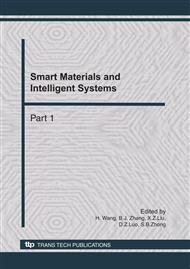[1]
U.D. Commerce: ENIAC- A Survey of Domestic Electronic Digital Computing Systems - Computers with names starting with E through H. US Department of Commerce (1955).
Google Scholar
[2]
S. Russell, and P. Norvig: Artificial Intelligence: A Modern Approach. Upper Saddle River, NJ: Prentice Hall (2003).
Google Scholar
[3]
R. Kurzweil: The Age of Spiritual Machines. Penguin Books (1999).
Google Scholar
[4]
P. McCorduck, N. MA and A.K. Peters: Machines Who Think. (2004).
Google Scholar
[5]
X.W. Zhou: Real-time joint Landmark Recognition and Classifier Generation by an Evolving Fuzzy System. 2006 IEEE International Conference on Fuzzy Systems (2006), pp.1205-1212.
DOI: 10.1109/fuzzy.2006.1681863
Google Scholar
[6]
J. Clune:. Heuristic evaluation functions for General Game Playing. In Proceedings of the Twenty-Second AAAI Conference on Artificial Intelligence (2007) pp.1134-1139.
Google Scholar
[7]
H. Finnson: CADIA-Player: A General Game Playing Agent. Master's thesis, Reykjavik University, (2007).
Google Scholar
[8]
S. Schiffel and M. Thielscher: Fluxplayer: A successful general game player. In Proceedings of the Twenty-Second AAAI Conference on Artificial Intelligence (2007), pp.1191-1196.
Google Scholar
[9]
M. Thielscher: Reasoning Robots: The Art and Science of Programming Robotic Agents. Applied Logic Series. Kluwer (2005).
Google Scholar
[10]
J. Schaeffer: The history heuristic and alpha-beta search enhancements in practice. IEEE Transactions on Pattern Analysis and Machine Intelligence vol. 11(1989), pp.1203-1212.
DOI: 10.1109/34.42858
Google Scholar
[11]
H. Finnsson and Y. Bjornsson: Simulation-Based Approach to General Game Playing. Proceedings of the Twenty-Third AAAI Conference on Artificial Intelligence(2008), pp.259-264.
Google Scholar


